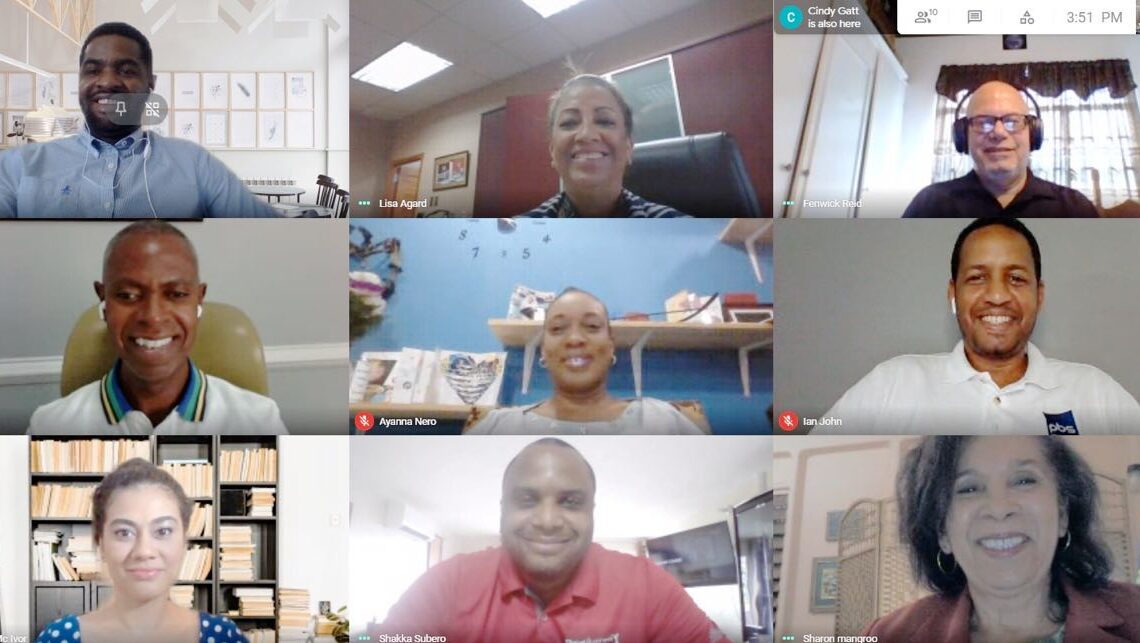
Telecom representatives in virtual conversation with the CEBM. Screenshot courtesy TSTT.
The last eighteen months have been a time of forced adaptation for every home, community, and organisation worldwide. The spread of the COVID-19 virus has impacted almost every human being somehow. Still, through it all, citizens, companies and organisations in T&T have tirelessly collaborated and found solutions to keep moving forward.
One such area of concern was connectivity related to online, remote learning, which became an official mandate by the Ministry of Education to reduce the spread and flatten the curve in 2020. Still, many children lacked direct internet access to continue their learning since this mandate took effect on 13th March 2020.
Archbishop Jason Gordon of the Archdiocese of Port of Spain and the Catholic Education Board for Management (CEBM) reached out to several telecommunications companies to help fill the gap in providing data service to the most in-need and at-risk students. These students were identified by the Principals of schools and referred to the Denominational Board for review.
In particular, students were assessed on several levels ranging from those needing devices and Internet access and those needing Internet access only. The CEBM determined that there were approximately 4,000 students without Internet access under their remit, of which 1,900 families indicated that they could only afford a low-cost solution. This information was circulated to all major telecommunications providers and other corporate entities in T&T for consideration. These included TSTT | bmobile, Digicel, Flow, Amplia, Massy Group, and PBS Technologies.
Lisa Agard, Chief Executive Officer at TSTT, shared that the company has long been engaged in ensuring connectivity for youth in T&T, particularly since the quarantine measures of 2020. She noted that, “In addition to zero-rating pertinent educational websites, TSTT has implemented and will continue to implement solutions that support the continuation of education for the nation’s students. Collaboration for a greater cause is also not new for TSTT.
In November 2020, TSTT collaborated with Digicel to assist the Telecommunications Authority of Trinidad and Tobago in procuring and securing 10,000 smart devices at the best possible rates, at a time when the demand for these was extremely high and supply almost nonexistent for smaller countries like ours on the world stage. Hand-in-hand with that, we understand that these devices only fulfil the intention behind them with well-established, always-on connectivity in the homes where it is needed.
We have worked closely with all organisations to evaluate and find the best-fit data solutions so that our students can continue to excel despite the massive structural changes in how they are receiving their education.”
Sharon Mangroo, CEO of the CEBM, welcomed this support from local companies, noting, “The Catholic Education Board of Management appreciates the initiative of the Telecommunications Service Providers to increase access to remote learning through this bridging of the digital gap.”
This initiative will provide low-cost wired broadband solutions, low cost-wireless solutions such as Mi-Fi devices and data-SIMs and low-cost tablet solutions on a strictly evaluated scale until the solution is no longer needed. Initially, the discounted data packages would be for six months and refreshed as required should remote learning remain in effect.
Parents and students who are still in need should contact their respective school’s administration for consideration in this initiative. A comprehensive assessment will be made as this is a limited and conditional offer meant only to facilitate connectivity for online learning, assessment and assignment submissions.

